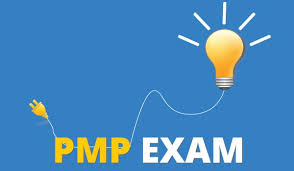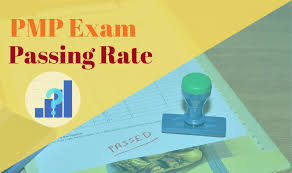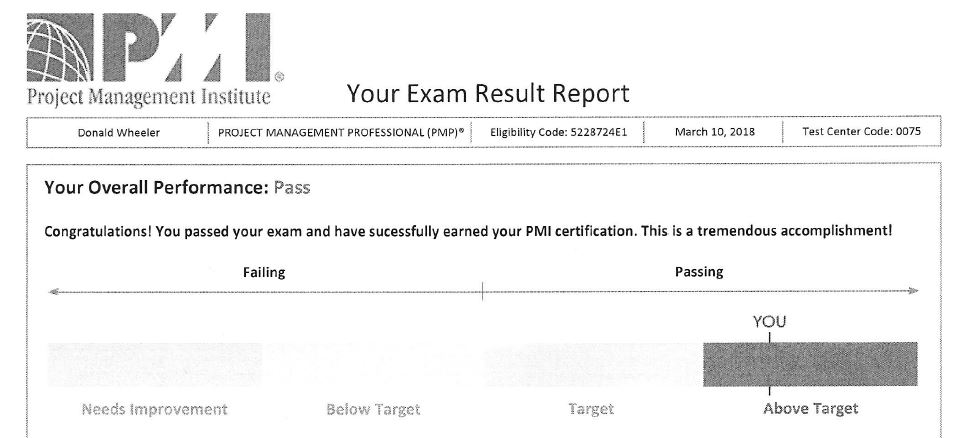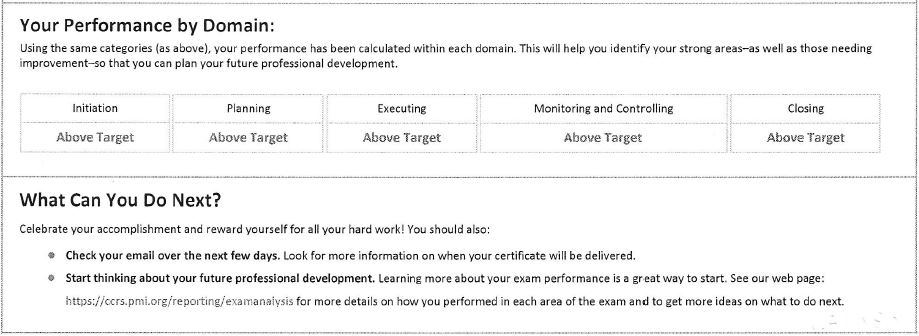Are you a working professional who wants to build his career in project management? Or are you an experienced project manager who wishes to attest his knowledge and experience? If yes, then you must be planning for PMP certification. Due to the fact, that this is the major step to get recognition in the market and attests to your knowledge in project management. Now before gearing up for the PMP exam, generally PMP certification aspirants wonder about two questions i.e. PMP passing score and what the PMP exam pass rate is.
In this article, we will explain to you about the PMP exam, PMP passing score, PMP exam pass rate, and interpretation of PMP exam results. This will help you to understand about PMP certification exam, PMP passing score, and PMP exam pass rate in detail.
Before diving into the details of the PMP passing score and PMP exam pass rate, let us first talk about PMP Certification.
PMP Benefits
PMP certification is a globally recognized, most popular, and valuable credential for project managers in the industry. This certification shows that you have the experience, training, and competency to lead and direct the project. This recognition is seen through expanded marketability to employers and a higher salary.
PMP certification is worldwide recognized regardless of industry, profession, or geographical scope of operation.
Besides, as per the Project Management Institute survey, this PMP certification positively impacts project manager salaries by an average of 25% more than their noncertified professionals.
PMP certification holds the global standards of excellence for validating the skills and the knowledge essential in a project management team. It further ensures that PMP certified individuals speak and understand the global language of project management.
Moreover, PMP certification helps you to expand your network by connecting you to a community of professionals, organizations, and experts worldwide.
PMP Certification Eligibility Criteria
To apply for PMP certification, you need to meet the below PMP prerequisites or eligibility criteria:
- Check your education and experience level against the eligibility criteria as per prerequisites of PMP certification mentioned below.
- You need to attend project management training from a recognized training institute and earn 35 PDUs or contact hours.
Once you fulfil both PMP certification requirements, then you need to plan to appear for the PMP exam.
| S.No. | Requirement in Education | Experience in leading and directing projects | 35 Contact Hours |
| 1 | You need to attend 4 year Degree Course | You need to have 3 years leading the project with 4500 Hours | 35 Hours of project management education/training |
| 2 | Secondary degree i.e. High School Diploma or global equivalent | You need to have 5 years leading the project with 7500 hours |
Remember that all the experience pertaining to project management must have been gained within the last 8 consecutive years prior to your submission of application.
Now, let us first talk about the PMP exam.
What is the PMP Exam?
To become PMP certified, you need to appear for the PMP certification exam. This exam is conducted by the Project Management Institute (PMI).
PMP Exam contains 180 questions. There are 230 minutes to complete the exam. The PMP Exam Questions will be a combination of multiple-choice, multiple responses, matching, hotspot, and limited fill-in-the-blank types of questions.

The main purpose of PMI to include these questions in the PMP exam is to monitor the performance of these questions and validate them for inclusion in the future exam database.
These questions are randomly placed all across the PMP exam. Here, the challenge is that you cannot identify these pretest questions in the exam as they are randomly placed.
You have to attempt all the questions with the same sincerity.
PMP exam is a closed book exam. Hence, you cannot refer to any material during the exam.
You will be given 4 hours to finish the PMP exam. Remember that there are no scheduled breaks during the examination. If you need then you are allowed to take the break but your exam clock continues to count down.
Before the PMP exam has started, you will get 15 minutes to go through the tutorial followed by a survey. It is not mandatory and this time is not included in the exam time of 4 hours.

Main points to remember for PMP Exam are:
- This exam is just not a test of the information of the main reference book i.e. PMBOK Guide
- You cannot pass the exam by only focusing on real-world experience.
- PMP training in project management which is aligned to the PMBOK Guide plays a vital role in passing the PMP Exam.
Furthermore, this exam has been designed to objectively assess and measure project management knowledge.
Besides, certified PMP experts write and review all the questions on the exam. Moreover, these questions are mapped with the PMP Exam Content Outline to ensure that an appropriate number of questions are placed in the PMP Exam.
The basis of the PMP Exam is the blueprint contained in the PMP Exam Content Outline. This lists the percentage of questions contained in each project management process group.
Questions in the PMP exam are generally based on PMBOK Guide and Code of Ethics and Professional Responsibility. Hence, PMP aspirant needs to demonstrate his proficiency in 5 domains. The below table represents the percentage of questions pertaining to each of the domain areas.
| Domain/Project Management Process Group | Percentage of Questions |
| Initiating | 13% |
| Planning | 24% |
| Executing | 31% |
| Monitoring and Controlling | 25% |
| Closing | 7% |
PMP Passing Score
There is a common belief that 61% is the PMP passing score however it is not an official score announced by PMI.
In actuality, there is no fixed PMP passing score. The fact is that no two PMP candidates will get the same set of questions. Therefore the passing score will vary.
Moreover, it depends upon the difficulty level of the question you will get in the PMP exam. Besides, each question does not have equal weightage. If you are lucky enough to get easy questions in the PMP exam then the PMP passing score will be higher in your case as compared to the PMP aspirant who will get relatively more difficult questions. As a result, it becomes even more inconclusive to determine how much PMP aspirants need to score in order to pass the exam.
The best rule is to not worry about the PMP passing score. We recommend PMP aspirants to study well and practice multiple mock exams and questions from different sources. You should try to achieve 75% or more in your practice exams consistently to build your confidence and make yourself pass the PMP exam confidently.
PMP Exam Pass Rate
What was the past rate before?
In earlier times till 2005, PMI has set the PMP passing score as 68.5%. This means PMP aspirants need to correctly answer 137 questions out of 200 questions. After some time, PMI drastically increased the PMP passing score to 80.6% (This means you need to score 141 out of 175 questions correctly). Further then PMI observed that there was a reduction in the number of candidates at this score considerably. Then in 2 months time period, they revised the PMP passing score from 80.6% to 60.6% and it was last published PMP passing score. It means that PMP aspirants need to answer 106 or more out of 175 questions correctly.
Further in the year 2007, PMI changed the criteria for passing the PMP exam. It started declaring results through proficiency level for each domain in test results rather than percentages in each domain.
PMI adopted a more scientific approach by using the sound psychometric analysis to determine the PMP passing score. PMI makes use of subject matter experts across the globe that cross-references the data of how candidates have actually performed to make sure that level of difficulty on each PMP exam is justified.
What is the PMP Exam Pass Rate Now?
In the current state, when you appear for the PMP exam, test results will represent the proficiency level i.e. whether the PMP candidate is ‘Proficient’ or ‘Moderately Proficient’ or ‘Below Proficient’ in each of 5 domains. Now, you will not get to know the numerical percentage you have scored in each of the 5 domains.
PMP passing score is based on how you rank in each of the five Process Groups, compared to average global rankings of other exam takers and certified project management professionals.
It further ensures that the exam is fairly done to provide project management statistics and overall industry knowledge assessments on a global level.
The PMP exam pass rate is the total number of people who passed the exam divided by the total number of students sat for the exam.
PMP Exam Pass Rate = (Number of People Passed the PMP Exam)/ (Number of People Sat for the PMP Exam)
Of course, there are statistics in PMI for these numbers however they do not disclose this information. There are some guesses, interpreted numbers but no one knows the actual PMP exam pass rate.
Interpretation of proficiency levels to understand PMP result
PMI has not given any clear indication that what will be the combination of proficiency levels which lead to overall PMP results. On analyzing various reports of PMP exam results, we have derived below observations:
- If PMP candidate achieves ‘Proficient’ in all 5 domains then undoubtedly you have reached the PMP exam pass rate.
- Incase PMP candidates achieve ‘Proficient’ in 4 domains and ‘Moderately Proficient’ in 1 domain then you have reached the PMP exam pass rate
- Incase PMP candidate achieves ‘Moderately Proficient’ in all 5 domains, then you may have reached the PMP exam pass rate.
- If PMP candidate achieves ‘Proficient’ in 3 domains and ‘Below Proficient’ in 2 domains, then there is a high probability that you will pass the PMP exam
- Incase PMP candidate achieves ‘Moderately Proficient’ in 4 domains and ‘Below Proficient’ in 1 domain then most probably you will pass the PMP exam
- If PMP candidate achieves ‘Below Proficient’ in 3 domains regardless of what you have achieved in the other 3 domain then most likely you won’t be able to reach the PMP exam pass rate
- Incase PMP candidate achieves ‘Moderately Proficient’ in 3 domains and ‘Below Proficient’ in 2 domains, then it is very likely that you will fail the exam
- If PMP candidate achieves ‘Below Proficient’ in more than 3 domains, then most likely you will not reach the PMP exam pass rate.
Below find the sample of PMP Exam Report, we get once we pass the PMP examination


You can see Donald Wheeler’s full PMP pass report here.
Conclusion
There is no official PMP passing score or PMP exam pass rate declared by PMI. The last published PMP Passing score was 61%. Now PMI doesn’t declare the percentage you score in each of 5 domains. In fact, PMP exam results are based on proficiency level i.e. ‘Proficient’, ‘Moderately Proficient’, or ‘Below Proficient’. Hence, there is no fixed PMP passing score. The best way to go for the PMP exam is not to worry about the PMP exam pass rate. Try to focus on scoring more than 75% in your practice exams to sit and pass the PMP exam confidently.
Once you’ve earned your PMP, the next step is keeping it in good standing. You need to earn PMP PDUs to keep your PMP in good standing. Learn 11 Ways to Earn PMP PDUs.



